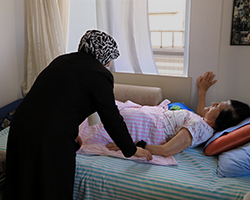
Photo: WHO/Rocío López
The Community Health Support Staff (CHSS) project supports the employment of Syrian personnel in the Turkish health sector. It acts as a bridge between homebound patients and Migrant Health Centres by having CHSS on the constant lookout for more complicated health issues that may require intervention by a doctor from the Refugee Health Training Centre.
As part of the programme CHSS can attend trainings on providing home care to the elderly and disabled, which are regularly offered by WHO. This gives employment opportunities to the participants and provides access to primary health care services to the patients.
The programme was launched in WHO’s seven Refugee Health Training Centres in 2018. As of January 2020, 279 CHSS members have been hired and 815 patients have benefited from home care services.
The project is run jointly by the World Health Organization and the Turkish Ministry of Health and funded by the German Government through KfW Development Bank.
Fateme fled Aleppo 4 years ago with her husband and 5 children. Back in the Syrian Arab Republic, she used to teach women and children in the nearby mosque.
“Before the war, life was good for us. I enjoyed helping the community,” she explains. “When the war broke out, everything became very difficult. Things were very expensive and there was barely food to eat.” Under these circumstances, the family decided to leave.
Fateme now lives in Turkey, in the southern city of Mersin. Like many Syrians in the country, she struggled to find a job. Then, friends told her about the opportunity to join WHO’s new training programme for the provision of home care to older and disabled Syrian refugees. Through this programme, WHO has already trained 350 Syrians to provide care to patients with limited mobility who have difficulty visiting health centres.
“This is a great opportunity,” she explains. “In Syria, I used to be very active teaching women and children. Here in Turkey I also wanted to do something, especially if I can help other Syrians. Staying at home was not an option!”
This project is funded by the German Federal Government through KfW Development Bank.




